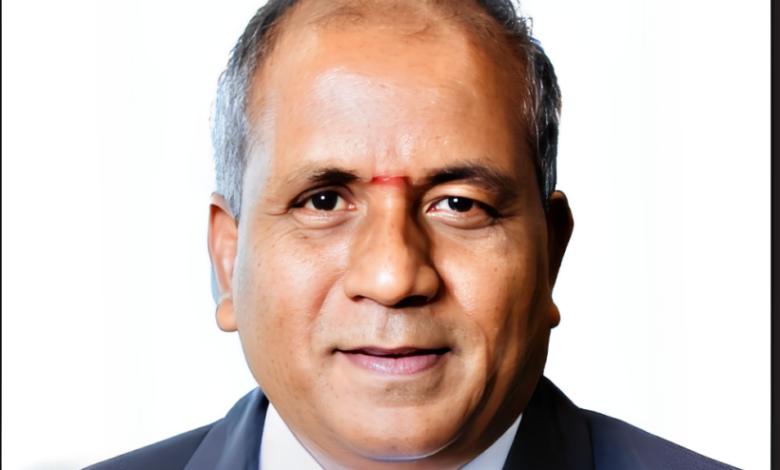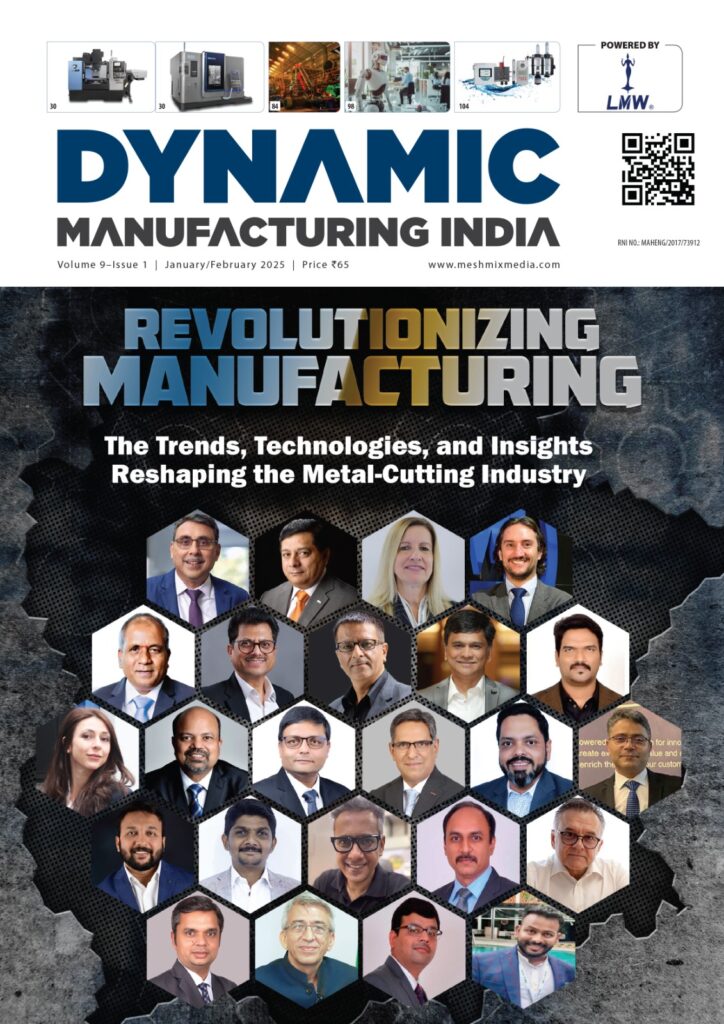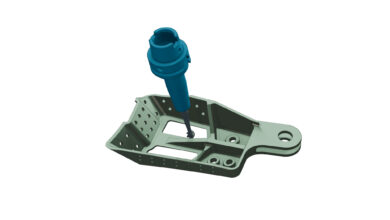Driving Excellence in Precision Manufacturing with GROB Machine Tools
Insights from Mr. L.J. Naidu, Managing Director, GROB Machine Tools India Pvt. Ltd

1 ) What recent advancements in metal-cutting technology have had the most transformative impact on efficiency and precision?
GROB machine tools have become a driving force in modern metal-cutting technology, offering a blend of advanced features that not only enhance efficiency but also redefine the standards for precision manufacturing. One of the key innovations is their focus on multi-axis machining centers, which significantly increase the flexibility and complexity of parts that can be produced in a single setup. By integrating up to 5 or even 6 axes of motion, GROB machines can handle intricate geometries that would otherwise require multiple machines or labor-intensive manual processes. This capability is particularly crucial for industries like aerospace, automotive, and medical device manufacturing, where parts often feature complex shapes, tight tolerances, and high material strength requirements.
The automation integration in GROB’s machines plays a vital role in reducing cycle times and human error while improving throughput. Their advanced robotics systems work in tandem with the machining processes, optimizing tool changes, part handling, and even complete process workflows. The use of robotics allows for greater flexibility in adapting to various part sizes and configurations, which reduces downtime between production runs and enables continuous, unmanned operation during off-peak hours or overnight shifts. This level of automation also supports just-in-time manufacturing processes, which are crucial for maintaining lean inventory levels and reducing costs.
GROB’s emphasis on precision tooling and advanced software solutions further elevates their machines’ capabilities. Their proprietary software allows operators to monitor and control machining operations with a level of sophistication that provides real-time feedback and predictive maintenance insights. This ensures that the machines run at optimal performance levels, preventing costly downtime and minimizing defects. Furthermore, their machines offer advanced thermal compensation and vibration control systems that improve surface finishes, reduce tool wear, and maintain the integrity of part dimensions even during high-speed operations.
Another hallmark of GROB machine tools is their modular approach to design. This adaptability enables manufacturers to customize systems based on their specific needs, whether it’s for high-volume production or the flexible production of low-volume, highly complex parts. With modular configurations, companies can easily scale up or reconfigure their machining lines without the need for a complete overhaul of their equipment. This versatility is a key advantage in industries with fluctuating production demands and evolving technological requirements.
Ultimately, the combination of high-performance machining, automation, modularity, and precision control makes GROB machine tools indispensable in today’s competitive manufacturing environment. They help companies stay ahead of the curve by delivering faster, more accurate, and cost-efficient solutions, empowering them to tackle the increasing complexity of modern manufacturing challenges.
2 ) How is the industry adapting to sustainable manufacturing practices, and what specific initiatives are helping to reduce environmental impact?
GROB machine tools are at the forefront of the industry’s shift toward sustainable manufacturing practices, with a strong emphasis on reducing environmental impact while maintaining high levels of performance. The company’s commitment to sustainability is evident in several key areas, such as energy efficiency, waste reduction, and resource optimization. Many of GROB’s advanced machining centres are designed with energy-saving features, including efficient motors, intelligent cooling systems, and low-energy components that minimize power consumption during operation. Additionally, GROB integrates technologies like automated tool changing and optimized machining strategies to reduce material waste, improve tool life, and enhance overall productivity. Their modular systems also promote sustainability by allowing manufacturers to adapt and reconfigure equipment for different production needs, minimizing the need for new machines and reducing resource consumption. Furthermore, GROB’s machines are designed with long-term durability in mind, leading to extended lifecycles and reducing the environmental footprint associated with frequent machine replacements. Through these innovations, GROB is helping manufacturers not only boost efficiency but also significantly reduce their carbon footprint and comply with increasingly stringent environmental regulations.
3 ) With digitalization reshaping manufacturing, what new skills are essential for today’s workforce, and how is the industry addressing the skills gap?
As digitalization reshapes manufacturing, GROB machine tools is actively addressing the evolving skills gap by fostering a workforce proficient in advanced technologies such as automation, data analytics, and integrated software systems. The company is increasingly embedding smart, connected features into its machines, including IoT capabilities, predictive maintenance tools, and real-time monitoring, which requires operators and technicians to be skilled not only in traditional machining but also in software interfacing, system diagnostics, and data-driven decision-making. To bridge the skills gap, GROB invests in comprehensive training programs that emphasize digital literacy, offering both in-house and remote learning platforms to keep employees up-to-date with the latest technologies. Additionally, the company partners with educational institutions and vocational programs to nurture the next generation of skilled workers, ensuring that they are equipped to handle the demands of highly automated, data-centric manufacturing environments. As the industry continues to evolve, GROB’s commitment to ongoing education and skills development is essential for maintaining a competitive and capable workforce in the face of rapid technological advancements.
4 ) What trends are driving the current demand for metal-cutting solutions, and how do you foresee the industry adapting to these trends?
The current demand for metal-cutting solutions is being driven by several key trends, including the increasing complexity of parts, the need for faster production cycles, and a growing emphasis on precision and quality in industries like aerospace, automotive, and medical manufacturing. As manufacturers strive to meet these demands, there is a clear shift toward high-performance, multi-axis machining centers that can produce intricate geometries with tight tolerances. GROB machine tools is well-positioned to address these trends by offering advanced multi-axis systems that combine high-speed machining with exceptional accuracy. Their machines are designed to handle complex materials, reduce cycle times, and ensure superior surface finishes, which are essential for industries requiring both precision and efficiency. Additionally, GROB’s emphasis on automation and digital integration, such as predictive maintenance and real-time monitoring, helps manufacturers improve uptime and optimize production workflows. In the future, as demand for high-mix, low-volume production increases alongside sustainability goals, GROB will likely continue adapting by enhancing the flexibility of its systems, promoting energy-efficient technologies, and providing scalable solutions that allow manufacturers to respond quickly to market shifts and evolving customer needs.
5) What do you view as the most significant challenges facing the metal-cutting industry today, and what steps is your organization taking to stay competitive?
One of the most significant challenges facing the metal-cutting industry today is the need to balance increasing demand for high-precision, complex components with the pressures of cost reduction and sustainability. As industries such as aerospace, automotive, and medical devices require more sophisticated parts, manufacturers must invest in advanced technologies while managing rising operational costs, material waste, and environmental regulations. GROB machine tools is proactively addressing these challenges by focusing on automation, energy efficiency, and flexibility. Their advanced machining centers, equipped with multi-axis capabilities, robotic automation, and integrated software, help manufacturers increase production speed and precision while reducing material waste and energy consumption. Additionally, GROB’s modular systems allow for customizable, scalable solutions that enable manufacturers to quickly adapt to fluctuating market demands, including low-volume, high-mix production runs. The company also prioritizes sustainability by developing machines with longer lifecycles and energy-efficient features, supporting manufacturers in their efforts to meet both performance goals and environmental standards. By continually innovating in these areas, GROB ensures its position at the forefront of the industry, helping clients remain competitive in an increasingly complex and cost-conscious manufacturing landscape.

E copy fo the magazine – https://www.machineinsider.com/dynamic-manufacturing-india-jan-feb-2025-edition/



